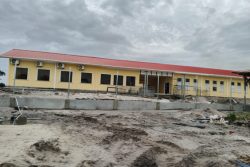Speaking at the opening of the 32nd meeting of the CARICOM Council for Trade and Economic Development (COTED) on September 18, 2009, former long-serving Secretary General, Edwin Carrington acknowledged that despite numerous policies, initiatives and strategies, the integration movement had not been able to effectively transform its ideas and plans for agriculture into an “acceptable reality”.
He challenged those present to make the meeting “truly special by taking decisions, which when the history is written, could be said to have been the turning point in agricultural development in the community”.
Mr Carrington said that the region must be looked at as one market for agriculture products. “We must therefore remove the barriers to trading among ourselves. We must challenge ourselves to develop the necessary protocols that would truly facilitate trade in agriculture products, while taking into account the need to secure plant and animal health and food safety. One must not be at the expense of the other,” he declared.
Having served as Secretary General for 18 years, Mr Carrington would be mightily disappointed that 13 years on nothing has changed.
A bevy of well-meaning initiatives including that named for former President Bharrat Jagdeo have fallen by the wayside and there is now much talk about the 25 x 2025 plan which conceives of a quartering of the US$6b annual CARICOM food import bill by 2025 and which now has the imprimatur of another Guyanese leader deeply associated with it, President Ali.
One waits to see how this disparate group of countries from Jamaica to Suriname will rise to this challenged in one of the long hoped for dreams of CARICOM statesmen. The portents, however, are just not good.
How at an elemental level are CARICOM countries going to cut their extra-regional imports of specific items by sourcing these from member countries when there are so many non-tariff and other barriers in the way? The tribulations of honey from Guyana and Grenada is a telling example of how regional solidarity and COTED have failed, are failing and will likely continue to do so to the detriment of the 25 x 25 scheme.
Guyana’s Ministry of Foreign Affairs last week set out the bitter history of honey’s travails in the wake of the lamentation of local producer Lance Hinds.
Even when Trinidad is not a major honey market of interest, Takuba Lodge says it has not been possible to trans-ship Guyana honey through the Twin Island Republic because of an archaic 1935 Act which Port of Spain has refused to amend despite years of high-level promises.
Grenada, which has had a long interest in gaining market access for honey into Trinidad brought the matter before COTED as far back as 2013. COTED considered the issue and decided that Trinidad’s denying of market access to honey of regional origin was in breach of the provisions of the Revised Treaty of Chaguaramas. COTED directed Trinidad to lift the prohibition and allow regional honey into their market and/or facilitate its trans-shipment to other markets, like in the case of Guyana. Since then, Takuba Lodge said that the issue of market access for honey has remained on the COTED Agenda and the regional Ministers responsible for Trade and Economic Development have consistently found that Trinidad remained in breach of the Revised Treaty and the Decisions of the COTED on the matter.
The ministry said that the matter was also considered the 104th Special Meeting of COTED on Agriculture, held in July 2022 and at the 55th COTED in November 2022. The Ministers at both meetings reiterated previous decisions of COTED that Trinidad remained in breach of previous decisions of the COTED, the Conference of Heads and its obligations under the Revised Treaty of Chaguaramas. The Ministers then requested Trinidad & Tobago to immediately take the necessary action to legislatively and administratively provide for the market access for honey of Community Origin. The latest is that the Trinidadian legislative process is to be finalised in 2023. Even if that were to be it would represent a 10-year-long campaign for a solitary and relatively insignificant item. Substitute honey for any number of items and one would have an appreciation of the daunting challenge facing the region.
It is also the case that Trinidad has been notoriously delinquent in meeting its COTED obligations and this has been a recurring decimal over a long period with a variety of products. That is not to say that Trinidad is the only transgressor but its historic barriers to key local commodities such as rice and sugar are well known.
Clearly CARICOM Heads, whether by unanimity or some other mechanism, must equip COTED with some enforcement muscle. No longer should any member of the integration movement be allowed to violate treaty obligations with impunity. Trinidad’s recalcitrance has now been backlit by the aggressive harvesting of oil and gas opportunities here by its private sector, a phenomenon that has left a bitter aftertaste when the matter of non-tariff barriers is considered.
If the 25 x 2025 initiative is not to collapse into ignominy, it requires very early this year that the CARICOM Secretariat and the various committees examine each country’s extra-regional imports and provide guidance on offsetting those by regional production. With full availability of market information that should not be very problematic but it still will not surmount the hindrances of archaic legislation, non-tariff barriers and plain bad-mindedness. It may not gravitate significantly to Mr Carrington’s “acceptable reality”.







